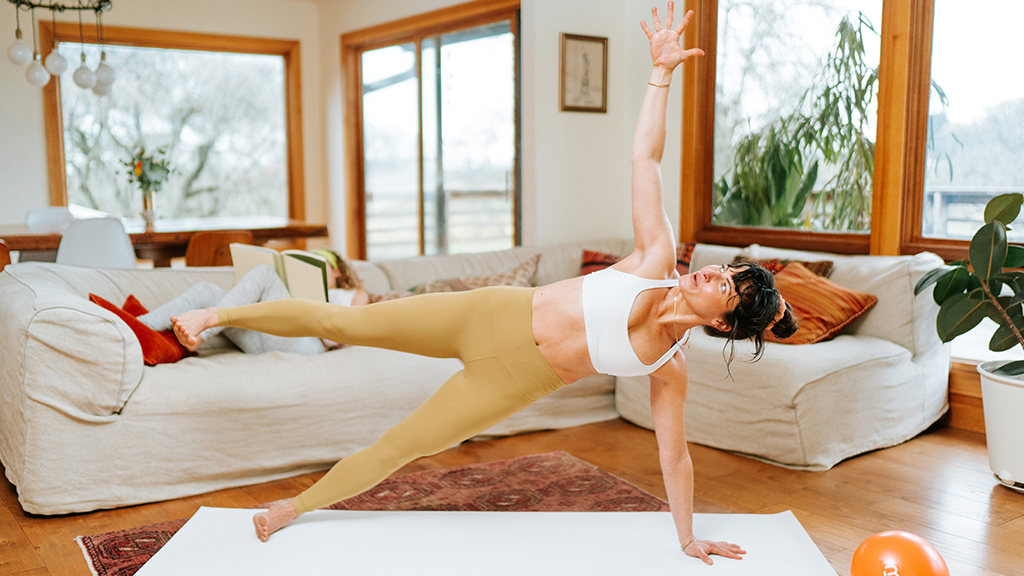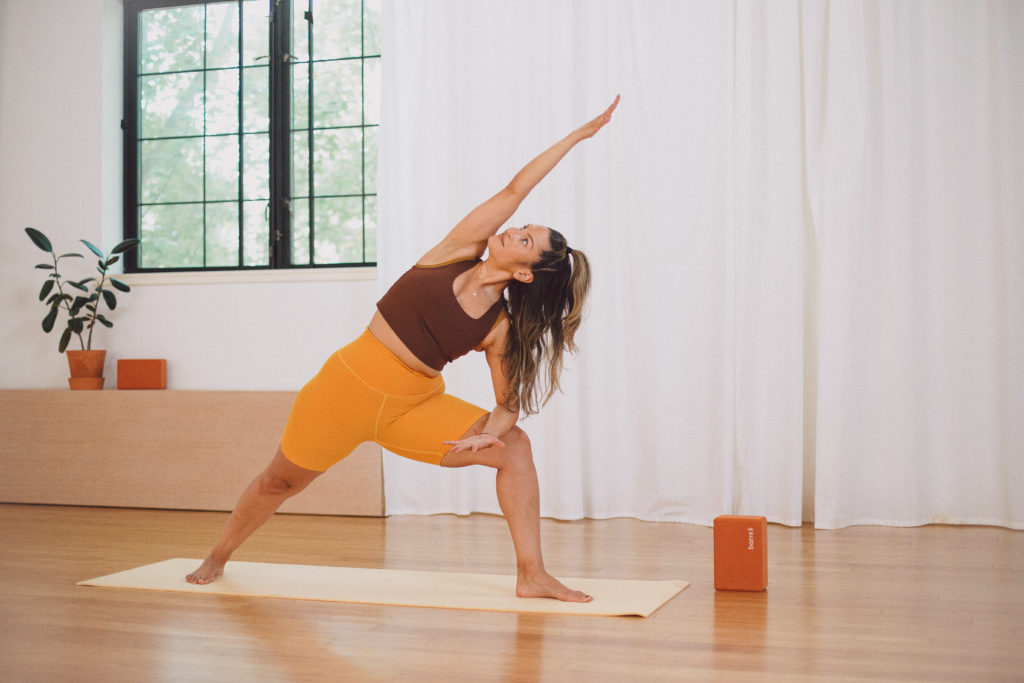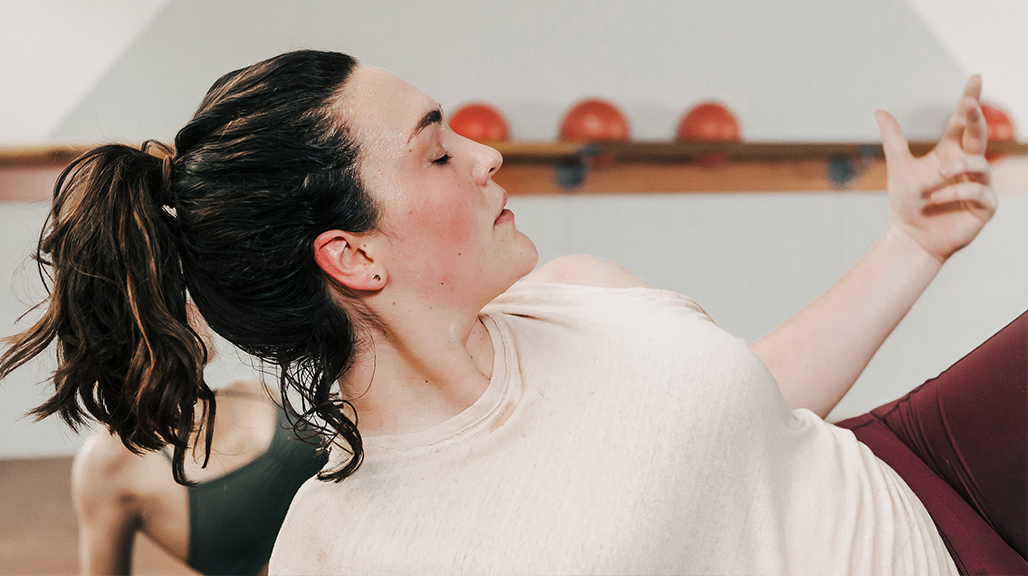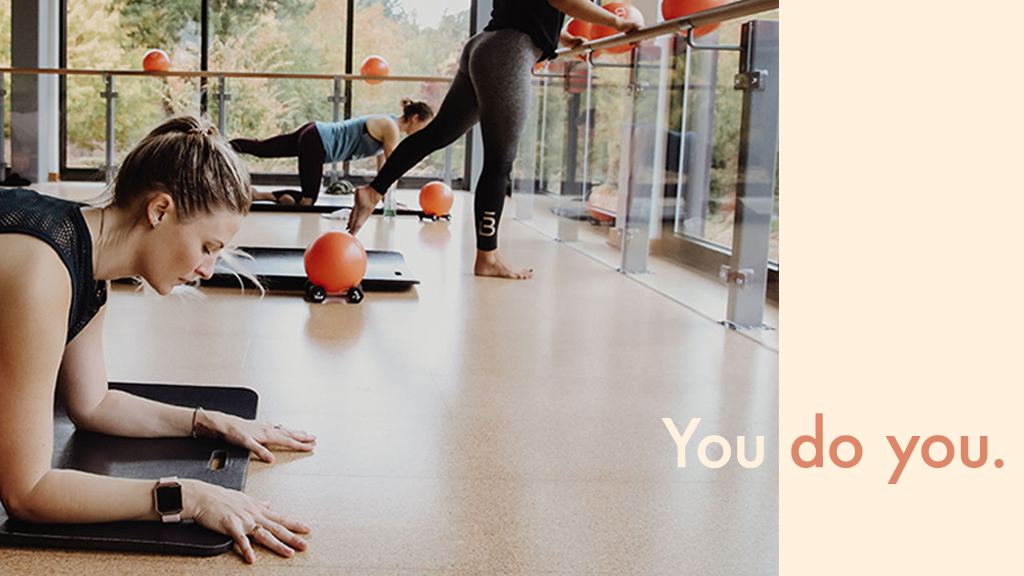Move
Your Go-To Guide For Keeping A Consistent Workout Routine
Tell us if this sounds familiar: You start a fitness routine, and for a little while, you’re feeling great. And then…life happens. Maybe a busy day means missing a workout, which then spirals into a few weeks without movement, and so on. We’ve been there, and while we all fall away from our routines from time to time, there are small things you can do to keep the inevitable unpredictabilities of life from upending your practice completely.
We chatted with speaker, educator, and author of The Feel Good Effect, Robyn Conley Downs, to get her ideas for committing to a consistent workout routine. (Hint: self-compassion plays a big role). If you’re finishing up the January Challenge and looking for ways to keep your barre3 practice going strong, you’ve come to the right place.
B3 MAG: So often, we think that willpower and grit are all that we need to commit to an exercise routine. Why doesn’t that approach work, and what would you suggest instead?
ROBYN: I always think about it from a research perspective. Willpower is a finite resource that can be depleted, and similarly, as can grit. So while there’s nothing wrong with using willpower or grit, we need to establish back-up systems to support us when these resources run out. If you’re relying on willpower and grit alone, then on the days they’re depleted, you’ll have nothing to fall back on.
I encourage people to shift to a more self-compassionate way of thinking, asking yourself what you need and how you want to feel. That approach utilizes a different motivator: It’s not pushing yourself because you have to do it. Instead, it’s coming from that place of understanding what you need and how you want to feel.
My second suggestion would be to work on those structures, habits, and routines so that your decision isn’t so reliant upon willpower. By building yourself a framework, these practices become a habitual part of your life and something that’s built into your routines.
B3 MAG: Exercise is often the first thing to go when life gets busy. Why do you think we’re so quick to abandon our self-care routines when our schedules get packed?
ROBYN: We really need to reframe and reclaim the whole concept of the purpose of movement in our lives. If you’re exercising to check a box or if it’s something you feel you have to do to achieve an external outcome–movement as another form of productivity–it’s going to be the first thing to go when life gets busy. But if you can reclaim movement as an investment in how you want to feel and how you’re showing up for yourself and others, then it becomes a lot easier to prioritize.
Rather than thinking about exercise as an item on your to-do list, think about it as fuel for the things that matter to you. It’s fundamentally different to think of fitness as a box to check versus as a way that you’re energizing your life.
Try to remember why you’re doing it. Why is exercise important? Why is movement important? How are they connected to your values and how you want to feel? On the days when it’s falling off your list, instead of feeling guilty and like you’re not getting enough done, come back to how you want to feel in your body and then prioritize from that place.
B3 MAG: You introduced us to the idea of exercise snacking (taking little bursts of movement throughout the day). How can that concept support us in keeping a consistent workout practice?
ROBYN: By reframing exercise as something that can be done in short bursts throughout the day rather than one set chunk of time, you can begin to find more opportunities during your day for movement. That practice helps you start seeing those moments when you can slip in an exercise snack.
What also happens is that you start to build a feedback loop. When you begin to incorporate those exercise snacks into your routine, the positive impact is immediate. You have more energy, plus you experience the mood-boosting effects, positive mental health impact, and the increased joy that exercise, even small bits of it, can bring. The more you can do it, the more you’ll receive those reinforcing and motivating messages.
B3 MAG: The all-or-nothing mindset is a common approach to fitness, but one that we know makes it challenging to find joy in movement. How do you respond when life gets in the way of you getting in a workout?
ROBYN: I always encourage people to approach these days with self-compassion. We can acknowledge that it was a hard day and accept that it’s something we all experience. From there, ask yourself what is the next kind choice you can make. Maybe that’s scheduling your workout for the next day, or tuning into your body and deciding that you need a day of rest.
I’ll also apply my Two Out of Three rule here. The Two Out of Three rule is essentially the idea that if you miss one day, get the next two. A missed day or a skipped workout doesn’t have to be the start of a spiral. You can accept that missing a day is normal and that you’ll get the next two. It can be very helpful for people to think about habits and routines this way, because it takes the power out of missing a day. The goal isn’t to get every day, but to do it more days than you don’t.
Approaching exercise with self-compassion is definitely not our culture default. Many people believe that self-compassion will make them weak or a quitter, but really it’s the opposite. Research has shown that self-compassion and flexible thinking will help you persist in the face of challenge, make you more resilient, and support you in reaching your goals.
So often, we hold ourselves to impossible standards and expectations, and we beat ourselves up when we don’t meet them. But there’s an alternative, which is to say to ourselves that today was hard, we had a lot going on, we were showing up for other people and our responsibilities, and that’s okay. And again, from there, you can proceed by asking yourself what’s the next kind choice you can make.
B3 MAG: Our bodies can’t properly support us without giving ourselves rest. How do you find a balance between days that you work out and days that you don’t?
ROBYN: It all comes back to asking yourself how you feel and what you need today. If you’re planning your workouts for the week or month ahead, you won’t necessarily know that the answer to that question is 25 days of working out and 5 days off, but it does allow you to make informed decisions in real time.
This can be a big jump for people, but as you tune in more to yourself, you start to learn and build that self-trust. People worry that if they ask themselves what they need, that they won’t ever work out again, but that’s not true either. As you develop that self-trust loop, you learn that your body is really good at telling you when it needs a break and that it’s also really good at telling you when you need to push more. That’s exactly the practice: Asking and honoring the answer.
B3 MAG: We love your mantra “Gentle is the new perfect.” How can we apply that idea to find success in our workout routine?
ROBYN: “Gentle is the new perfect” is all about learning self-compassion. I’ve come to think about my workout as an opportunity to practice self-compassion as much as it is a chance to support my physical health. For many of us, our biggest challenge isn’t getting physically stronger, but learning how we can be kind to ourselves.
Let’s use Plank as an example of how this can show up in your workout. Maybe you’re only thinking about engaging your muscles and pushing through something, but at the same time, you also have the opportunity in this posture to ask yourself what you need in this moment and what’s the kind choice you can make for your body.
You’re still doing Plank, but you’re also tapping into your intuition. Practicing self-compassion might be taking a modification and it might also be realizing you need to physically engage your quads. You’re asking what is the kindest choice you can make and how does that connect to and support how you want to feel. This practice will fundamentally change your approach to exercise. Once you make self-compassion a part of the practice, it can have a life-changing effect.
Keep your barre3 routine strong all year with our special offer: Get a 15-day free trial plus up to 50% off online workouts. Join today.
To get more inspiration and insights on reframing wellness and feeling good, follow Robyn on Instagram and pick up her book The Feel Good Effect wherever books are sold.
Tell us if this sounds familiar: You start a fitness routine, and for a little while, you’re feeling great. And then…life happens. Maybe a busy day means missing a workout, which then spirals into a few weeks without movement, and so on. We’ve been there, and while we all fall away from our routines from time to time, there are small things you can do to keep the inevitable unpredictabilities of life from upending your practice completely.
We chatted with speaker, educator, and author of The Feel Good Effect, Robyn Conley Downs, to get her ideas for committing to a consistent workout routine. (Hint: self-compassion plays a big role). If you’re finishing up the January Challenge and looking for ways to keep your barre3 practice going strong, you’ve come to the right place.
B3 MAG: So often, we think that willpower and grit are all that we need to commit to an exercise routine. Why doesn’t that approach work, and what would you suggest instead?
ROBYN: I always think about it from a research perspective. Willpower is a finite resource that can be depleted, and similarly, as can grit. So while there’s nothing wrong with using willpower or grit, we need to establish back-up systems to support us when these resources run out. If you’re relying on willpower and grit alone, then on the days they’re depleted, you’ll have nothing to fall back on.
I encourage people to shift to a more self-compassionate way of thinking, asking yourself what you need and how you want to feel. That approach utilizes a different motivator: It’s not pushing yourself because you have to do it. Instead, it’s coming from that place of understanding what you need and how you want to feel.
My second suggestion would be to work on those structures, habits, and routines so that your decision isn’t so reliant upon willpower. By building yourself a framework, these practices become a habitual part of your life and something that’s built into your routines.
B3 MAG: Exercise is often the first thing to go when life gets busy. Why do you think we’re so quick to abandon our self-care routines when our schedules get packed?
ROBYN: We really need to reframe and reclaim the whole concept of the purpose of movement in our lives. If you’re exercising to check a box or if it’s something you feel you have to do to achieve an external outcome–movement as another form of productivity–it’s going to be the first thing to go when life gets busy. But if you can reclaim movement as an investment in how you want to feel and how you’re showing up for yourself and others, then it becomes a lot easier to prioritize.
Rather than thinking about exercise as an item on your to-do list, think about it as fuel for the things that matter to you. It’s fundamentally different to think of fitness as a box to check versus as a way that you’re energizing your life.
Try to remember why you’re doing it. Why is exercise important? Why is movement important? How are they connected to your values and how you want to feel? On the days when it’s falling off your list, instead of feeling guilty and like you’re not getting enough done, come back to how you want to feel in your body and then prioritize from that place.
B3 MAG: You introduced us to the idea of exercise snacking (taking little bursts of movement throughout the day). How can that concept support us in keeping a consistent workout practice?
ROBYN: By reframing exercise as something that can be done in short bursts throughout the day rather than one set chunk of time, you can begin to find more opportunities during your day for movement. That practice helps you start seeing those moments when you can slip in an exercise snack.
What also happens is that you start to build a feedback loop. When you begin to incorporate those exercise snacks into your routine, the positive impact is immediate. You have more energy, plus you experience the mood-boosting effects, positive mental health impact, and the increased joy that exercise, even small bits of it, can bring. The more you can do it, the more you’ll receive those reinforcing and motivating messages.
B3 MAG: The all-or-nothing mindset is a common approach to fitness, but one that we know makes it challenging to find joy in movement. How do you respond when life gets in the way of you getting in a workout?
ROBYN: I always encourage people to approach these days with self-compassion. We can acknowledge that it was a hard day and accept that it’s something we all experience. From there, ask yourself what is the next kind choice you can make. Maybe that’s scheduling your workout for the next day, or tuning into your body and deciding that you need a day of rest.
I’ll also apply my Two Out of Three rule here. The Two Out of Three rule is essentially the idea that if you miss one day, get the next two. A missed day or a skipped workout doesn’t have to be the start of a spiral. You can accept that missing a day is normal and that you’ll get the next two. It can be very helpful for people to think about habits and routines this way, because it takes the power out of missing a day. The goal isn’t to get every day, but to do it more days than you don’t.
Approaching exercise with self-compassion is definitely not our culture default. Many people believe that self-compassion will make them weak or a quitter, but really it’s the opposite. Research has shown that self-compassion and flexible thinking will help you persist in the face of challenge, make you more resilient, and support you in reaching your goals.
So often, we hold ourselves to impossible standards and expectations, and we beat ourselves up when we don’t meet them. But there’s an alternative, which is to say to ourselves that today was hard, we had a lot going on, we were showing up for other people and our responsibilities, and that’s okay. And again, from there, you can proceed by asking yourself what’s the next kind choice you can make.
B3 MAG: Our bodies can’t properly support us without giving ourselves rest. How do you find a balance between days that you work out and days that you don’t?
ROBYN: It all comes back to asking yourself how you feel and what you need today. If you’re planning your workouts for the week or month ahead, you won’t necessarily know that the answer to that question is 25 days of working out and 5 days off, but it does allow you to make informed decisions in real time.
This can be a big jump for people, but as you tune in more to yourself, you start to learn and build that self-trust. People worry that if they ask themselves what they need, that they won’t ever work out again, but that’s not true either. As you develop that self-trust loop, you learn that your body is really good at telling you when it needs a break and that it’s also really good at telling you when you need to push more. That’s exactly the practice: Asking and honoring the answer.
B3 MAG: We love your mantra “Gentle is the new perfect.” How can we apply that idea to find success in our workout routine?
ROBYN: “Gentle is the new perfect” is all about learning self-compassion. I’ve come to think about my workout as an opportunity to practice self-compassion as much as it is a chance to support my physical health. For many of us, our biggest challenge isn’t getting physically stronger, but learning how we can be kind to ourselves.
Let’s use Plank as an example of how this can show up in your workout. Maybe you’re only thinking about engaging your muscles and pushing through something, but at the same time, you also have the opportunity in this posture to ask yourself what you need in this moment and what’s the kind choice you can make for your body.
You’re still doing Plank, but you’re also tapping into your intuition. Practicing self-compassion might be taking a modification and it might also be realizing you need to physically engage your quads. You’re asking what is the kindest choice you can make and how does that connect to and support how you want to feel. This practice will fundamentally change your approach to exercise. Once you make self-compassion a part of the practice, it can have a life-changing effect.
Keep your barre3 routine strong all year with our special offer: Get a 15-day free trial plus up to 50% off online workouts. Join today.
To get more inspiration and insights on reframing wellness and feeling good, follow Robyn on Instagram and pick up her book The Feel Good Effect wherever books are sold.










0 people have left a comment. Join the conversation!
View Comments